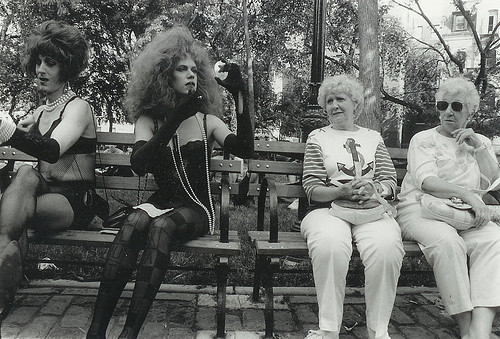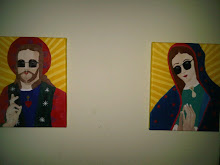Introduction to Beshert: It Was Meant to Be
When my mother expressed to me that I was the chosen one from the third generation asked to commemorate my grandmother’s experience and write an introduction for her memoir, my nausea was quickly settled by the image of “Buffy the Vampire Slayer.” The absurdity lies in the comfort I find in this television show. Buffy is known as “the chosen one”, a term that is constantly used in Judaism. The chosen one comes with an air of power, chosen over however many to be the one, the only one. Yet what I was chosen to be was the keeper of remembering the Holocaust, an event I am completely removed from. This is a problematic power that critically seems just wrong to take a position in. Instead of growing up experiencing “choseness” through the bible, I have experienced “choseness” through television sitcoms and children movies. Today, “choseness” has a fairytale concept attached to it, no longer godly, no longer holding the weight of religious power. Remembering an event I am generationally removed from, only allows me to examine certain themes in my grandmother’s memoir and form a removed discourse as to how these themes translate into my own life.
When I was growing up, one thing that my parents made very clear to me was that I was Jewish. That was it. I learned more about God at my preschool, Temple Sollel. Before every lunch we would thank him for bread. I remember impatiently waiting for the “Amen” and then we would all annihilate a slice of challah. I always questioned why we thanked God when he was just that painting of an old guy with a beard to the floor. Prayer, challah, and paintings of God did not exist at my parent’s home. Instead rules such as no shoes in the house, no drawing on the walls, and one candy per night from Halloween were practiced. My parents did not spend a lot of time teaching me about my Polish heritage, the only rule, that is the rule of no shoes in the house, seemed to be the last remnent of the old world that my parents continued to teach in the new world.. At an early age I understood that we were just American, and it would be foolish to think of myself as a Polish-American. Yet while my parents were rejecting the old world for the new world, they still held on to the old world, ashamed to completely throw it all away. One thing my mother held on to the past was when she gave my sister and I our middle name, Eibuszyc. I grew up embarrassed about my middle name. Its impossible pronunciation made me an easy target for being different, a difference I barely understood or identified with. When my mother expressed to me that I was the chosen one from the third generation asked to commemorate my grandmother’s experience and write an introduction for her memoir, I felt an unease. How could the third generation, so removed from the actual experience form a discourse about the Holocaust? If I were to sit here and write that I think about the Holocaust, and how it affected my grandmother's life and my mother's life I would only be writing lies. This does not mean that what I am about to write is anything close to a universal truth. The reason I choose to distance myself as a way to engage in my grandmother's experience of the Holocaust is because I have not experienced real trauma. If one no longer experiences trauma he or she cannot experience real hope. My grandmother’s generation’s hopefulness has created my generation’s hopelessness. I am the third generation, the third generation deeply immersed in the age of information, the generation of the removed.
I became more aware about what it meant to be Jewish when I participated in the musical “Fiddler on the Roof”. Yet no matter how many times my dad would sing along to the song “Tradition” just as jovial yet not as fat as the patriarch, I still did not believe him. In the song “Tradition”, Tevye, sings about controlling his family, having the final word, marrying off his daughters, and his wife raising the children and taking care of the home. All of these things seemed so interchangeable in the Judaism I was learning through my parents. Yes, my father would have his word but ultimately my mother had the final one, this would pretty much be settled by either my sister or I confronting our father that he was “Notamomma”. Although my mother was a stay at home mom, I participated in Indian Princesses to spend more quality time with my dad, and watched my mother unnecessarily clean up after the housekeeper. One thing was for certain, although my father would not have full control over my marriage, it was very much hinted that I was expected to marry someone Jewish. As my great-aunt would say, “anything other than a Jewish boy is just puppy love”. The concept of tradition that my grandmother’s generation grew up with, justifies faith as a repetitive behavior or action that is passed down through generations and is expected to be followed. Here is where a conflict of interest stews, my parents always hesitated in raising my sister and I with the traditions they grew up with, perhaps this is because those traditions cannot exist in the world today. The conflict of interest has continued with me, for this behavior from my parents has greatly affected the way I view concepts such as tradition, commitment, marriage, and religion. Today I cannot define tradition into a present concept. Tradition reminds me of an empty shell, an empty shell that some creature squeezed its body out of, only to be left on the ocean’s floor. I know what tradition was, but it has no place in the world today, now tradition comes with an empty hollow shell of naïve devotion.
Throughout my grandmother’s memoir the concept of home continuously takes a stab at my own consciousness as I try to identify home’s true meaning. My grandmother’s generation is a generation of uprooted homelessness, exiled and forever traveling in search of a home, yet cautiously never settling anywhere. What home means to my generation, is that the search itself is absurd and doomed to fail. The concept of home beseeches the third generation no longer lost and trying to recreate but rather destroyed due to the trauma of the Holocaust and globalization. The third generation is connected to the lack of belonging to a home. We are living in a transitory state of being; we are living in a state of transcendental homelessness. The generations before left us with the notion to always be in search for home, yet the effect of globalization renders that home can be found anywhere. But this only corrupts the concept of home, for home is now nowhere. This third generation should be coined “The Little Monsters”, and I say this because of the saying “home is where the heart is”. There is no home to find the heart, the third generation is beyond human, every concept has been hollowed out, sucked of any notion that is authentic or actual, and instead is filled with the emptiness of satire. This has become possible because irony has processed itself into our everyday transactions. The concept of home, once forced to be filled with ideals that cannot exist today, lays as empty as that shell on the sea’s floor, for the third generation wanders like zombies incapable of producing a foundational home. Anyone who enters a space and calls it "home sweet home" is not to be trusted. When Isaac took Rebekah into his dead mother’s tent, one can easily question if he showed her his true heart. The reason why one cannot be trusted in the transitory home, is because the true self cannot exist in a space filled with irony, rather this place becomes a space for one to constantly be evaluating the self.
One ideal that was once forced within the home was what it meant to be a woman, in terms of marriage and commitment. My grandmother’s generation understood the word commitment very differently then how my generation views the word commitment. When two people married each other, he or she were committed. Women use to be expected to raise the children and clean the home. Today commitment comes with an escape button, divorce. My parent’s generation created the option for couples to duel who gets to go to work and who gets to raise the kids, whether to hire a full-time nanny or a once a month housekeeper. What my grandmother’s generation did not experience was variety; the rules where black and white, follow them or else. Today the rules have so many exceptions, not necessarily bad, but I think it is fair to say that options make the act of choosing difficult. Commitment in its truest form was when my grandmother stayed behind because of my grandfather. I think what my parent’s generation has taught my generation is to always think as an individual, to never rely on anyone other than the self or family. My grandmother’s memoir Beshert, It Was Meant to Be, makes the claim that whatever one is left with in the end is what they deserved. I do believe that in my upbringing I was taught that no matter what “cards I was dealt” I had the power to make the next move, or to “play my cards right”. Beshert also can be defined as a romantic destiny, when one has found his or her true love. In the age of information the mysticism of love has died because of the available option of divorce. It has died because divorce has redefined commitment, it has redefined that even commitment cannot stay committed to its own definition. If one is unable to commit then he or she is an individual. The challenge today is remaining an individual when forming a commitment to another person, committing means self-sacrfice. Another issue that is arising is seeing how hard parents’ work to have a family, spreading one’s seed has come with a hefty price. Along with being taught to be an individual, selfishness is attributed to this characteristic. To work not as hard and support yourself seems to be a better choice in this world’s economy. Just as tradition and commitment seem to be reexamined, the world is struggling to create the real modern family. The satire that is created in the concept of a modern family is convoluted, whether it is of a couple of the same sex, an older man with a younger woman, an older woman with a younger man, or two people of different nationalities or skin color, the fact is that the word family will never mean what people desire it to mean. Theodore Adorno claimed that since Auschwitz poetry could not exist; yet I believe it is more than that. Since Auswitch family, tradition, commitment and religion cannot exist. It is not the real modern family we are searching for, it is not the Jones’ or the opposite of the Jones’, but rather the other, the cyborg nonfamily.
Art by: Diane Arbus
Art by: Diane Arbus





No comments:
Post a Comment